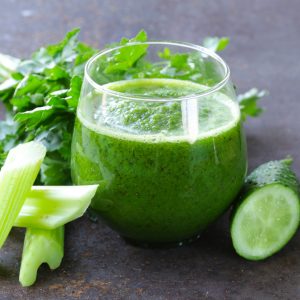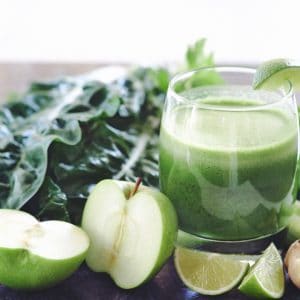Have you ever wondered why celery juice has become a wellness sensation seemingly overnight? Driven by its myriad health benefits, many are turning to this humble green drink for an invigorating start to their day. Within this guide, we’ll unravel the genuine health benefits of drinking celery juice, debunk some common misconceptions, and even share a quick recipe. Dive in to discover how this potent elixir might just be the revitalizing solution you’ve been seeking for your juice cleanses.
“Celery juice is one of the most profound ways, if not the most profound way, to restore digestive health. It is that powerful.”
–Anthony William, Author of The Medical Medium Books
The book that started my journey into juicing. It’s a best seller for a reason.
- Hardcover Book
- William, Anthony (Author)
- English (Publication Language)
- 592 Pages - 04/21/2020 (Publication Date) - Hay House Inc. (Publisher)
Celery Juice Nutrients
When it comes to nutritious beverages, celery juice often stands out in the crowd. But what makes it so unique? Let’s take a closer look.
Vitamins: Celery juice is a powerhouse of essential vitamins. It contains vitamin K, which plays a pivotal role in blood clotting and bone health. It’s also rich in vitamin A, crucial for vision and immune function. There’s a good dose of B vitamins, particularly B2 and B6, supporting energy metabolism and nerve function. And let’s not forget vitamin C, an antioxidant that boosts the immune system and skin health.
Minerals: Essential minerals like potassium and manganese are abundant in celery juice. Potassium aids in muscle function and maintaining a healthy blood pressure, while manganese is essential for bone formation and blood clotting.
Phytonutrients: One of the standout attributes of celery is its phytonutrients. These chemicals, naturally occurring in plants, possess potent antioxidant and anti-inflammatory properties. Apigenin and luteolin are two such antioxidants found in celery, believed to counteract inflammation and possibly assist in treating various inflammatory diseases.
Folate & Pantothenic Acid: Folate is essential for DNA synthesis and repair, and pantothenic acid helps in the production of red blood cells.
While celery juice is indeed nutritious, it’s essential to remember that when celery is juiced, it contains less fiber than raw celery. Fiber is pivotal for digestive health, so while celery juice can be a healthy addition to your routine, it shouldn’t completely replace whole celery in your diet.
In essence, sipping on celery juice offers a concoction of several essential nutrients, essential for the body’s overall health and wellness. However, like with any superfood, moderation is key, and it’s always best when paired with a balanced diet. Cheers to good health!

The Actual Health Benefits of Celery Juice
Celery juice has gained immense popularity in recent times, and for good reason. But it’s essential to differentiate between anecdotal claims and scientifically-backed benefits. Here’s what the research says about the many health benefits of celery juice:
Anti-inflammatory Properties: A standout feature of celery juice is its potent anti-inflammatory benefits. The antioxidants apigenin and luteolin found in celery have shown potential in reducing inflammation. This is particularly beneficial for inflammatory diseases, such as arthritis. For instance, a 2015 study on mice indicated that apigenin could suppress the severity and onset of arthritis.
Beneficial for Respiratory Allergies: Research indicates that luteolin could be promising for allergic asthma and rhinitis, inflammatory diseases affecting the airway. A study in 2017 showed that mice given luteolin before allergen exposure had significantly reduced inflammation in their lungs and nasal passages.
Neuroprotective Qualities: The same antioxidants, luteolin and apigenin, may protect against neurodegenerative diseases. A 2013 study found that rats treated with luteolin showed reduced brain cell damage and improved cognitive function. Another 2015 review discovered that apigenin could potentially delay and slow the progression of Alzheimer’s disease.
Potential Anti-Cancer Effects: Preliminary research suggests that luteolin may inhibit the growth of certain cancer cells and prevent cancer cells from metastasizing. It might even enhance the efficacy of chemotherapy drugs while reducing their toxic effects.
Positive Effects on Blood Pressure and Cholesterol: A limited 2015 study showed that celery leaf extract lowered cholesterol levels in rats. Another study in 2019 indicated that celery juice could reduce systolic and diastolic blood pressure in individuals with hypertension.
Promotes Cardiovascular Health: Luteolin’s antioxidant properties can counteract free radicals, limiting heart damage. A 2015 animal study found that rats given luteolin had reduced cardiovascular remodeling, a change in the heart’s shape and function due to chronic high blood pressure or heart disease.
Possible Benefits for Fertility: While direct research on celery juice benefits on human fertility is limited, studies show that the antioxidants in celery might improve male fertility markers, like sperm count and motility.
While these benefits highlight the potential nutritional value of celery juice, it’s essential to approach them with a balanced perspective. Many of the studies are preliminary, conducted on animals, and larger human trials are needed to solidify the scientific evidence to support claims. Still, incorporating celery juice into a balanced, healthy diet, can be a nutritious choice for many.

Drinking Celery Juice: The Best Practices
The myriad potential benefits of celery juice are indeed enticing. But to maximize these benefits and ensure you’re drinking it in the healthiest way possible, it’s wise to follow some best practices. Here’s a guide to help you make the most of your celery juice experience:
Go Organic When Possible: Opt for organic celery to minimize your exposure to pesticides. Since you’re juicing the whole stalk, the chance of consuming any residual chemicals is higher with non-organic options.
Freshly Squeezed is Best: Drinking celery juice immediately after juicing preserves the nutritional integrity of the drink. The longer it sits, the more nutrients it can lose due to oxidation.
Start Small: If you’re new to celery juice, begin with a smaller amount and gradually increase. This allows your system to adjust. A typical serving size is 16 ounces, but starting with 8 ounces (or less) can be easier on your digestive system.
First Thing in the Morning: Consuming celery juice on an empty stomach first thing in the morning can enhance absorption of its nutrients. Wait at least 15 to 30 minutes before consuming other foods or drinks.
Don’t Add Other Ingredients: While it might be tempting to throw in some apples or carrots for flavor, doing so can dilute the potency and effectiveness of the celery juice. If you must, a squeeze of lemon or lime can be a mild addition without overwhelming the primary benefits.
Invest in a Quality Juicer: The type of juicer you use can impact the juice quality. Cold press or masticating juicers tend to preserve more nutrients than centrifugal juicers.
Be Mindful of Side Effects: Some people may experience digestive discomfort, especially when starting. Be aware of how your body reacts, and adjust the amount you consume if necessary.
Consistency is Key: Like most health practices, consistency tends to yield the best results. While you don’t have to consume it daily to gain benefits, regular intake can be more beneficial than sporadic consumption.
Maintain a Balanced Diet: Remember, celery juice isn’t a magic cure-all. It’s most effective when incorporated into a well-rounded, nutritious diet. Relying solely on celery juice and neglecting other dietary needs can be detrimental.
Store Properly: If you must store your juice, ensure it’s in a tightly sealed container to minimize oxidation. Consume within 24 hours for the best nutrient retention.
By following these best practices, you can enjoy the potential celery juice benefits while ensuring you’re treating your body right. Always listen to your body’s signals and adjust your intake accordingly.
How to Make Celery Juice
Juicing celery at home is a straightforward process, and you don’t need to be a culinary expert to nail it. If you are new to juicing celery a quick word of warning. The juice will taste different EVERYTIME. I have found that organic, fresh celery produces the sweetest, and cleanest taste.
Whether you have a juicer or just a blender, here’s a step-by-step guide to help you extract the refreshing goodness of celery:

Using a Juicer:
Select Your Celery: Aim for fresh, organic celery. A bunch typically yields 16 ounces of juice, but this can vary based on size and freshness.
Wash Thoroughly: Rinse the celery stalks under cold running water to remove any dirt or debris. If it’s not organic, consider using a produce wash.
Trim and Prep: Cut off the base and the top leafy part of the celery stalks.
Juice Away: Feed the celery stalks through your juicer. Depending on your juicer’s design, you might have to cut the stalks into smaller pieces.
Serve Immediately: Pour the juice into a glass and enjoy! As mentioned earlier, freshly squeezed celery juice offers the most health benefits.
Looking for a juicer for celery? This is what I use and its great. Cold press juicers preserve the nutrients better than any other type of juicer.
What I really like is that this juicer is easy to clean!!!
- NON-STOP JUICING: Powers through tough ingredients for powerful, non-stop juicing.
- CONTROL PULP: Total Pulp Control allows for customized juice with two interchangeable pulp filters: Less Pulp and Lots of Pulp.
- PROGRAMS: 2 one-touch programs for simple use: Start/Stop and Reverse.
- POWER: Powerful high-torque motor base rotates auger at low speeds.
- EASY SETUP: Simple assembly makes for no-hassle setup and cleaning.
Using a Blender:
Prep the Celery: After washing and trimming the celery stalks as mentioned above, chop them into smaller, manageable pieces.
Blend: Place the chopped celery into the blender and blend until smooth. Depending on your blender’s power, this can take a few minutes.
Strain: Use a nut milk bag, fine mesh strainer, or cheesecloth over a bowl or jug to separate the juice from the pulp. Gently press or squeeze to extract as much juice as possible.
Serve and Savor: Pour the strained juice into a glass and enjoy immediately.
Tips:
Chilled Celery: For a colder and more refreshing drink, you can refrigerate the celery stalks before juicing or blending.
Preservation: If you need to store your juice, do so in an airtight container in the refrigerator. Consume within 24 hours to maintain freshness and nutrient content.
Use the Pulp: Instead of discarding the pulp, consider adding it to soups, stews, or smoothies. It’s a great source of fiber!
Embracing the art of making celery juice at home not only ensures you’re getting the freshest possible drink but also allows you to appreciate the process behind this health trend. So, whether you’re a seasoned juicer or a newbie, relish the refreshing and nourishing taste of homemade celery juice.

Potential Side Effects and Considerations
While celery juice is touted for its health benefits, it’s crucial to recognize that, like anything, it’s not a one-size-fits-all remedy. As with any dietary change, it’s essential to be informed and considerate of potential side effects. Here are some aspects to keep in mind:
Allergic Reactions:
Some individuals may be allergic to celery. Symptoms can range from mild skin rashes to severe anaphylactic reactions.
Always start with a smaller serving if you’re trying celery juice for the first time to monitor for any adverse reactions.Diuretic Effects:
Celery juice has natural diuretic properties, which means it can increase urine production. This can lead to dehydration if you’re not adequately hydrating.
For those on diuretic medications or with certain kidney conditions, it’s essential to consult a healthcare professional before incorporating regular celery juice into your routine.
Salt Content:
Celery contains natural sodium. While it’s not a significant amount, those on low-sodium diets or with high blood pressure should be aware of their overall sodium intake.
Photosensitivity:
Consuming large amounts of celery juice can increase the skin’s sensitivity to sunlight due to the presence of furocoumarins. This can lead to quicker sunburns or skin rashes when exposed to sunlight.
Drug Interactions:
Celery juice can interfere with certain medications, especially thyroid medications, diuretics, and blood thinners. Always consult with your healthcare provider if you’re on medication and considering regular celery juice consumption.
Gastrointestinal Issues:
Some people might experience bloating, gas, or diarrhea when they start drinking celery juice. This is usually temporary as your digestive system adjusts, but if it persists, consider reducing the amount or discontinuing use.
While celery juice can be a nutritious addition to many people’s diets, it’s essential to approach it with a balanced perspective. Listen to your body, and if you’re unsure or have underlying health conditions, always seek guidance from a healthcare professional.
Remember, every individual is unique, and what works wonders for one might not be ideal for another.

Frequently Asked Questions
What happens if I drink celery juice every day?
Drinking celery juice daily can offer a range of health benefits, thanks to its rich nutrient profile. You might experience improved hydration, enhanced digestive function, and potential detoxification benefits.
However, consistent daily consumption can also lead to some side effects for certain individuals, such as increased sensitivity to sunlight, potential dehydration due to its diuretic properties, or interactions with specific medications.
It’s always advisable to monitor how your body responds and consult with a healthcare professional if you’re considering making it a regular part of your routine.
Is Celery Juice Good for Weight Loss?
While it is popular with juice cleanses that are related to weight loss, there is no real evidence that celery juice is responsible for the actual weight loss. If you drink celery juice daily it will help with you gut health which will in turn help your body process food more efficiently. If you want to lose weight then it definitely won’t hurt you in your journey.
Can I Juice Celery Leaves?
Absolutely! Celery leaves are often overlooked, but they are entirely safe and beneficial to juice. Not only are they packed with flavor, but they also contain a good amount of vitamins and minerals. When juicing the entire celery stalk, including the leaves, you are maximizing the nutrient intake.
However, keep in mind that celery leaves can have a slightly bitter taste, so if you’re new to celery juice, you might want to start by using fewer leaves and gradually increasing the quantity as you get accustomed to the taste.
Remember to always wash the celery thoroughly, including the leaves, to remove any potential pesticides or contaminants before juicing.
What is celery juice good for, beyond the previously mentioned benefits?
Beyond the outlined celery juice benefits mentioned, celery juice can:
Alkalize the body: Its alkaline properties can help balance the body’s pH levels, potentially aiding in reducing acidity and creating an unfavorable environment for disease.
Support liver function: Some believe that the detoxifying properties of celery juice can assist the liver in flushing out toxins, thereby potentially enhancing its function.
Provide essential enzymes: Celery juice is a source of natural enzymes that can improve gut health, aid digestion and absorption of nutrients.
Boost energy: The hydration and electrolyte balance provided by celery juice can help in maintaining stable energy levels throughout the day.
Always remember, while eating celery and drinking celery juice can be beneficial, it shouldn’t replace a balanced diet or be viewed as a cure-all.
Key Takeaways
In the world of health and nutrition, celery juice has emerged as a popular wellness drink, celebrated for its rich nutrient profile and potential health benefits. From its vitamins and minerals to the significant antioxidants it contains, this simple green juice offers more than just hydration.
Rich Nutrient Content: Celery juice is packed with essential vitamins and minerals like vitamin K, A, B2, B6, C, folate, potassium, and manganese, providing a nutrient boost with every sip.
Potential Health Benefits: Research suggests that celery juice benefits range from reducing inflammation and aiding digestion to potentially supporting liver function and cardiovascular health.
Making the Juice: Preparing celery juice is straightforward. Using fresh celery stalks and a blender or juicer will yield the best results.
Cautionary Notes: Despite its benefits, celery juice may not be for everyone. It contains psoralen, which can increase skin sensitivity to sunlight. It’s also essential to be aware of its salt content and potential allergenic properties.
FAQ Insights: Drinking celery juice daily can be beneficial, but it’s essential to be aware of potential side effects. It can be an alkalizing, detoxifying, and energy-boosting addition to a balanced diet.
Incorporating celery juice into one’s routine can be a healthful choice, but as with any nutritional endeavor, moderation and awareness of one’s body’s response are crucial.



